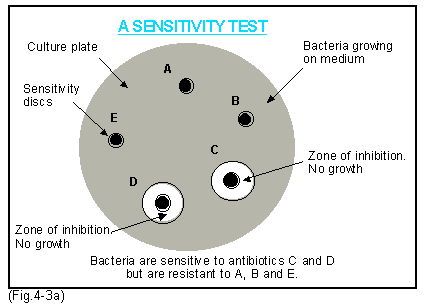



Antibacterial sensitivity tests
Some antibacterial medicines are more active against gram-positive than gram-negative bacteria and others are the reverse. This gives a guide to the choice of medicine to be used. Medicine sensitivity tests carried out in laboratories give a better guide against specific infections, but this is not a perfect one. Some bacteria which are sensitive in laboratory tests are not sensitive in diseased animals. They may be multiplying in sites where the medicine cannot reach them, or the antibiotic is not reaching them in high enough concentrations.
In its simplest and commonest form the test is carried out by growing the bacteria in a growth medium and then suspending them in a saline solution. A thin film of this is spread over the surface of a culture plate and left to dry. Discs of cardboard impregnated with different antibiotics are placed on the surface and the plate is then incubated. The medicine diffuses out into the growth medium radially. If the organism is killed by the antibiotic there is a clear zone of no growth around the disc. If the organism is resistant to the medicine it grows right up to the disc. Such tests usually take 12 - 24 hrs. Some bacteria however take weeks to grow.






